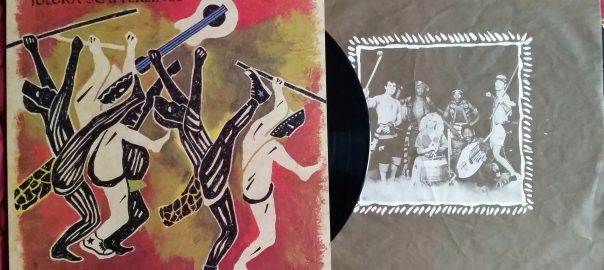Welcome to the third in an occasional series of reviews of albums in my collection that need revisiting. Most of these are older albums, or obscure albums, or both…at any rate, a little attention never hurt. Maybe you will find something interesting.
Juluka: Scatterlings
Released 1982
Personnel:
- Johnny Clegg: Vocals, guitar, umhupe mouth-bow
- Sipho Mchunu: Vocals, guitar, concertina
- Gary Van Zyl: Bass, percussion, vocals
- Zola Mtiya: Drums, percussion, vocals
- Scorpion Madondo: Flute, vocals
- Mike Faure: Saxophone
- Mike Makhalemele: Saxophone
- Glenda Millar: Keyboards and synthesizers
Tracklist
- Scatterlings of Africa
- Spirit is the Journey
- Umbaqanga Music
- Digging for Some Words
- Shake My Way
- Siyayilanda
- Kwela Man
- Simple Things
- iJwanasibeki
- Two Humans on the Run
The first time I ever heard Scatterlings I was stunned. It is easy enough to wax hyperbolic when we hear music that strikes our fancy, but in this case it is no exaggeration to say that this album was a revelation. The rhythms, the percussive sounds, the dominance of the acoustic guitars, and most of all the richly intricate Zulu language vocal harmonies were like nothing I had ever heard before. At its core the music is infused with traditional South African sounds and styles, but nevertheless it is unmistakably modern, fully comprehensible and accessible.
When Johnny Clegg, musician and future anthropologist, was 16, he met the Zulu migrant worker Sipho Mchunu, who had come to Johannesburg to find work. Clegg had already begun to immerse himself in the umbaqanga and kwela music that made up so much of South African street music, and in Zulu traditional dance. He and Mchunu founded Juluka, a band of mixed white and black musicians, a subversive and risky move given the political context of South Africa at the time. Despite the difficulties in finding venues to play in and radio stations that would air their music, they became a popular band and by the time Scatterlings, their fourth album, was released, they had garnered enough international attention to undertake a tour of Europe and North America.
The whole album is magnificent, with almost no weak or filler tracks. The general lyrical themes address the physical and psychological realities of trying to live normal lives in apartheid-era South Africa; the words are generally not overtly political but are nevertheless suffused with political undertones. Still, there are some songs that deserve special mention.
The album opens with the band’s major hit, “Scatterlings of Africa”: we instantly know that we are not in Kansas anymore. A song of haunting vocal chants and rhythms, acoustic guitar, and a poignant reminder that we are all humans, one people, tied together by time and origins, despite all that tries to tear us apart. As a paleoanthropologist by training, I find this song anthemic in ways hard to describe.
“Digging for Some Words” is an ominous track, dealing with the ongoing strife in the region when Angola and Mozambique struggled for independence from their brutal Portuguese colonizers. South African mercenaries were deeply involved, and this thinly-veiled protest song, with its martial rhythm, is saturated with sinister, apocalyptic symbolism and metaphors.
The incandescent “iJwanasibeki” is a song that I find utterly compelling; a song of gold miners, of stubbornness and pride, with its magnificent chorus and rich backing vocals and remarkable percussive bass line anchoring the whole track. There doesn’t seem to be any easily-found translation for the chorus, but it is a glorious song.
Scatterlings long ago introduced me to the rich potential of “world” music in the sense of music that transcends borders and styles. For me, it is the epitome of the fusion of western and traditional music. It probably was not unique for its time, but it was, and remains, one of the most successful. Even Paul Simon’s celebratory Graceland, which apparently was influenced by Juluka, did not achieve the pure syncretic glory of Scatterlings. Indeed, I can’t help thinking that this album cracked the door open for me to find and love a series of albums that also fuses traditional ideas with modern sounds, but that would not come along for another three decades. Not that they sound even remotely the same, but they hit me in the same musical spot.

